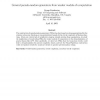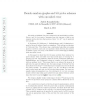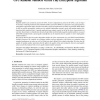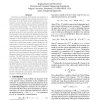429 search results - page 1 / 86 » General Pseudo-random Generators from Weaker Models of Compu... |
ISAAC
2009
Springer
13 years 11 months ago
2009
Springer
FOCS
1999
IEEE
13 years 8 months ago
1999
IEEE
Various efforts ([?, ?, ?]) have been made in recent years to derandomize probabilistic algorithms using the complexity theoretic assumption that there exists a problem in E = dti...
CORR
2011
Springer
12 years 8 months ago
2011
Springer
We study probabilistic bit-probe schemes for the membership problem. Given a set A of at most n elements from the universe of size m we organize such a structure that queries of t...
EGH
2010
Springer
13 years 2 months ago
2010
Springer
Random numbers are extensively used on the GPU. As more computation is ported to the GPU, it can no longer be treated as rendering hardware alone. Random number generators (RNG) a...
CVPR
2000
IEEE
14 years 6 months ago
2000
IEEE
The Errors-in-Variables (EIV) model from statistics is often employed in computer vision thoughonlyrarely under this name. In an EIV model all the measurements are corrupted by no...




